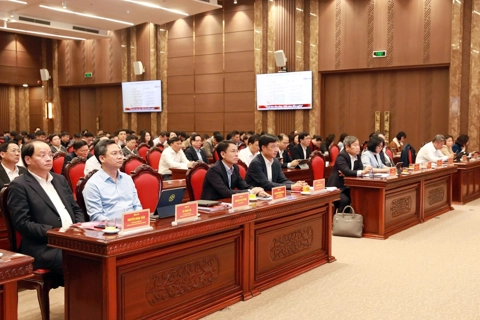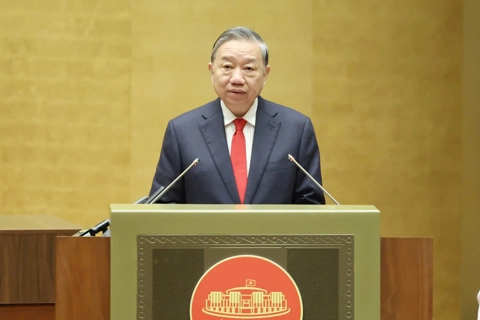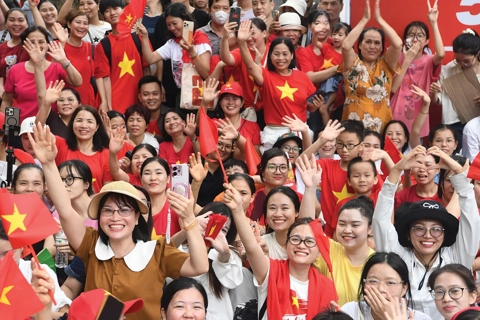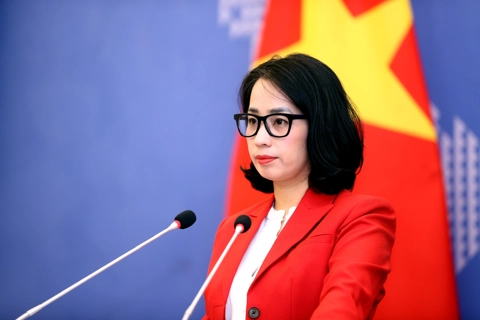Vietnam supports global action against plastic waste
Vietnam has joined hands to make the Global Treaty on Plastic Pollution to address growing problems that threaten sustainability.
Vietnam strongly supports participating in negotiations to build a Global Agreement on Plastic Pollution, Truong Duc Tri, Deputy Director General of the Vietnam Agency of Seas and Islands (VASI), said at a workshop on Regional Cooperation toward the Global Treaty on Plastic Pollution held in Hanoi on July 26.
| From left: UNDP Resident Representative in Vietnam Ramla Khalidi, Deputy Director General of the Vietnam Agency of Seas and Islands (VASI) Truong Duc Tri, Deputy Head of Mission of the Norwegian Embassy in Hanoi Mette Moglestue. Photo: UNDP |
“By joining hands to make the Agreement, Vietnam, as a very active and responsible country and other nations will show a spirit of solidarity to work with the international community to solve the problems of plastic pollution,” Tri said at the event co-organized by VASI and the United Nations Development Programme (UNDP).
The workshop was attended by representatives from eleven countries of the Partnerships in Environmental Management for the Seas of East Asia (PEMSEA) and other non-member countries. It was held as a side event of the 15th East Asia Seas Partnership Council Meeting.
UNDP Resident Representative in Vietnam, Ramla Khalidi stressed the importance of cooperation in addressing the expanding plastic pollution problem, highlighting two critical aspects in the fight against plastic pollution, including recognizing, supporting, and ultimately enhancing the contributions of informal waste workers to the waste management system.
She said realizing the ambitious goals of the Global Treaty on Plastic Pollution will require adequate financing, especially through innovative financing mechanisms, in which the informal sector in Southeast Asian member states plays an important role in waste management. The women and men who lead this sector are often unsung heroes in the fight against plastic pollution.
Deputy Head of Mission of the Norwegian Embassy in Hanoi, Mette Moglestue, said the Ending Plastic Pollution Innovation Challenge (EPPIC), funded by Norway, can bring together both member and non-member countries of the PEMSEA to discuss and contribute to the Treaty’s negotiation process.
“It is important for all parties involved to agree on various measures throughout the life cycle of plastic, from the production and design phase to waste management. It is also equally important that the agreement should contain legally binding obligations that can effectively reduce plastic pollution,” she emphasized.
Regarding the Treaty, she said: “As a co-lead of the High Ambition Coalition to stop plastic pollution, the Norwegian government’s vision is that the treaty will pave the way for a more sustainable plastics value chain globally, regionally, and nationally and promote solutions.”
| Seeking measures to address plastic pollution becomes global effort. |
Regional efforts
In the context of the ongoing negotiations on a legally binding treaty on plastic pollution, the workshop aimed to share the outputs, achievements, and lessons learned from the UNDP-Norway regional project entitled "Ending Plastic Pollution Innovation Challenge" (EPPIC).
UNDP has been actively working towards addressing the plastic pollution crisis through EPPIC. This ASEAN-wide competition funded by the Norwegian Agency for Development Cooperation, invites innovators from across the region to share their groundbreaking ideas for tackling plastic pollution.
The EPPIC initiative began in 2021 in Vietnam and Thailand, followed by successful implementations in Indonesia and the Philippines in 2022. In 2023, EPPIC expanded its scope to include Lao and Cambodia, highlighting the effectiveness of regional collaboration in addressing environmental challenges.
Meanwhile, the workshop provided updates on results from the Intergovernmental Negotiating Committee (INC) to deepen the knowledge of PEMSEA members on the various policies and provisions being discussed under the INC and their potential impacts. The workshop also presented actions, tools, initiatives, and progress related to crucial policies and measures being discussed under the INC to encourage their adoption and upscale in national and local policy-making processes.
Participants in the workshop came to the consensus that fighting plastic pollution requires teamwork. An agreement was reached on a joint paper outlining a cooperative approach to combating plastic pollution and contributing to the Global Treaty on Plastic Pollution creation. This coordinated effort exemplifies the spirit of regional cooperation and the common resolve to fight plastic pollution for the benefit of the East Asia Seas region and beyond.











